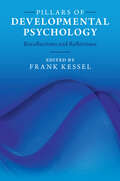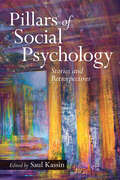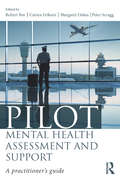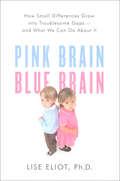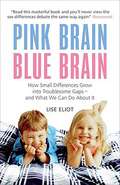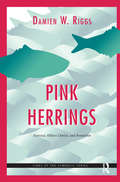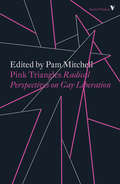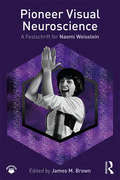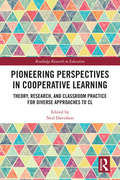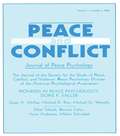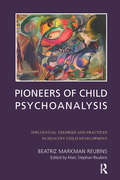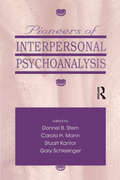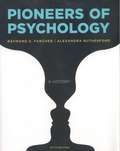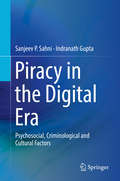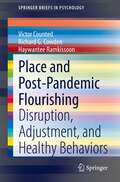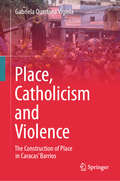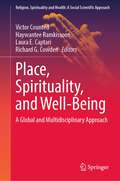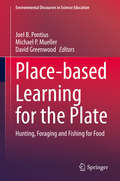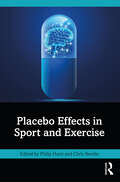- Table View
- List View
Pilgrimage through Loss: Twelve Pathways to Strength and Renewal after the Death of a Child
by Linda Lawrence HuntThe death of a child immerses parents into a life-long challenge of living with one of life's most heartbreaking losses. Pilgrimage through Loss tells the story of one family's journey, along with interviews from thirty other mothers and fathers who add their voices to the silences that often surround suffering in our 'mourning-avoidant' culture. Hunt illuminates the varied pathways parents eventually discover that open their lives to strength and healing. Rather than prescribing a path that will lead to recovery, Hunt encourages parents to find the pathways that work for them as they seek to engage life again with meaning and hope. Each chapter includes questions for reflection and discussion, plus recent research on grief and loss. Pilgrimage through Loss not only helps grieving parents, it also provides an insightful resource for those wanting to understand and come alongside a family in grief.
Pillars of Developmental Psychology: Recollections and Reflections
by Frank KesselEmbark on a journey through the rich tapestry of developmental psychology with 'Pillars of Developmental Psychology.' This collection reveals personal histories of influential scholars, the living 'pillars,' whose decades-long contributions have shaped the discipline. The book deepens the argument that a complete understanding of the field requires the human narratives that have woven its fabric, complementing and going beyond analytical views. These 'pillars' not only recount the achievements and challenges of their journeys, but also highlight how their work can inspire future generations. This reflective anthology resonates across disciplines, offering invaluable insights for scholars and students alike. A framing preface, tantalizing abstracts, illuminating chapters, and a closing commentary amplify the significance of these scholars' contributions, revealing overarching themes in personal, inter-personal, institutional, socio-political, and intellectual dimensions. "Pillars of Developmental Psychology" is a testament to the enduring impact of these luminaries and a roadmap for the dynamic future of developmental inquiry.
Pillars of Social Psychology: Stories and Retrospectives
by Saul KassinThis collection of first-person accounts from legendary social psychologists tells the stories behind the science and offers unique insight into the development of the field from the 1950s to the present. One pillar, the grandson of a slave, was inspired by Kenneth Clark. Yet when he entered his PhD program in the 1960s, he was told that race was not a variable for study. Other pillars faced first-hand a type of sexism that was hardly subtle, when women were not permitted into the faculty dining room. Still others have lived through a tremendous diversification of social psychology, not only in the United States but in Europe and Asia, that characterizes the field today. Together these stories, always witty and sometimes emotional, form a mosaic of the field as a whole – its legends, their theories and research, their relationships with one another, and their sense of where social psychology is headed.
Pills, Skills, and Will
by Stephen Luce Jr.My psychologist, Dr. J. Mark Pratt, says &“What you do most is what you do best.&” Certainly, full-time paid employment takes up most of my time, and I am so grateful for that. Coming in close second, however, is mental health treatment. Appointments with psychiatrists/psychologists, mental health support groups, obtaining required blood work from the lab, filling pharmacy prescriptions, going to church, reading literature, and praying/meditating. Also common is doing volunteer work, helping friends and family with tasks, and listening to them when they are troubled. These activities give me positive thoughts that I am contributing to society and help keep me away from the negativity that has been a hallmark of my mental illness.Thus it has become a life that I truly believe is one worth living. In the early stages of recovery (the late 1990s) I did not share this view. But I survived those tumultuous days and have now entered into an expansive place where peace, even joy, is a common experience.The psychiatric and psychological treatments that have made this possible cost my mom, Gwen, a lot of money. Although, I have been able to remove this burden from her more recently. It occurred to me that if I could write a book delineating the various aspects of my treatment program, I could share these helpful concepts with others, virtually for free. That is the spirit in which this book is published, and I hope you can utilize it for increased mental health and well-being!
Pilot Mental Health Assessment and Support: A practitioner's guide
by Robert Bor, Carina Eriksen, Margaret Oakes and Peter ScraggThe presentation of mental illness at work has different implications and consequences depending on the specific nature of the job, work context, regulatory framework and risks for the employee, organisation and society. Naturally there are certain occupational groups where human factors and/or mental illness could impair safety and mental acuity, and with potentially devastating consequences. For pilots, the medical criteria for crew licensing are stipulated by regulatory aviation authorities worldwide, and these include specific mental illness exclusions. The challenge of assessment for mental health problems is, however, complex and the responsibility for psychological screening and testing falls to a range of different specialists and groups including AMEs (authorised aviation medical examiners), GPs and physicians, airline human resources departments, psychologists, human factor specialists and pilots themselves. Extending and developing the ideas of Aviation Mental Health (2006), which described a range of psychological issues and problems that may affect pilots and the consequences of these, this book presents an authoritative, comprehensive and practical guide to modern, evidence-based practice in the field of mental health assessment, treatment and care. It features contributions from experts in the field drawn from several countries, professions and representing a range of aviation-related organisations, displaying a range of different skills and methods that can be used for the clinical assessment of pilots and in relation to specific mental-health problems and syndromes.
Pink Brain, Blue Brain: How Small Differences Grow Into Troublesome Gaps—And What We Can Do About It
by Lise EliotA scientific study of the differences between boys & girls that tackles damaging gender stereotypes and offers practical guidance for parents & educators.In the past decade, we’ve heard a lot about the innate differences between males and females, so we’ve come to accept that boys can’t focus in the classroom and girls are obsessed with relationships. In Pink Brain, Blue Brain, neuroscientist Lise Eliot turns that thinking on its head. Presenting the latest science from birth to puberty, Eliot zeroes in on the precise differences between boys and girls, reining in harmful stereotypes. She argues convincingly that infant brains are so malleable that what begin as small differences at birth become amplified over time, as parents and teachers—and the culture at large—unwittingly reinforce gender stereotypes.The good news is that by appreciating how sex differences emerge—rather than assuming them to be fixed biological facts—we can help all children reach their fullest potential. Eliot offers teachers and parents concrete ways to help close the troubling gaps between boys and girls ultimately end the gender wars that currently divide us.
Pink Brain, Blue Brain: How Small Differences Grow into Troublesome Gaps - And What We Can Do About It
by Lise EliotTurning conventional thinking about gender differences on its head, Lise Eliot issues a call to close the troubling gaps between boys and girls and help all children reach their fullest potential. Drawing on years of exhaustive research and her own work in the field of neuroplasticity, Eliot argues that infant brains are so malleable that small differences at birth become amplified over time as parents, teachers, and the culture at large unwittingly reinforce gender stereotypes. Indicating points of intervention where social pressures can be minimised, she offers concrete solutions for helping everyone grow into wellrounded individuals.
Pink Herrings: Fantasy, Object Choice, and Sexuation (The\lines Of The Symbolic Ser.)
by Damien W. RiggsPink Herrings engages in a re-examination of six of Freud's cases via Lacan's account of sexuation. Specifically, the book outlines a theoretical framework in which sexuation is understood as a 'choice' made in response to the fact of the sexual non relationship. In making this choice, unconscious fantasy allows for the circulation of object a, which bear traces of jouissance. Drawing upon Lacan's distinction between phallic and other jouissance, Pink Herrings examines the four positions outlined in Lacan's formula of sexuation, and maps these onto the six case studies. In so doing, Pink Herrings not only brings new life and insights to the cases, but also clears a path to what is referred to as a 'clinic of sexuation'. Such a clinic would not replace existing Lacanian psychoanalytic practice (with its focus on the structures of neurosis, perversion and psychosis), but instead provide additional avenues through which to explore the operations of fantasy.
Pink Tourism: Holidays of Gay Men and Lesbians
by Howard L. HughesThis book presents a detailed picture of gay and lesbian tourism from, primarily, a marketing perspective and examines how marketing activity engages with and affects social issues relating to homosexuality. It gives an overview of the nature of homosexuality and relevant issues that bear upon tourism and marketing.
Pink Triangles: Radical Perspectives on Gay Liberation
by Pam Mitchell"To link socialism and lesbianism is to link the unpopular with the taboo"Though the interpretations of the interplay between sexism and capitalism, between the personal and the political, vary across this spectacularly wide ranging collection, each essay shares two fundamental premises. First, that the oppression of gays and lesbians is not an isolated case, and therefore their struggle is necessarily part of a larger movement for social liberation. And second, that the experience of gays and lesbians uphold the basic tenants of a foundational marxism, and that they are uniquely placed to contribute to a revitalization of marxist theory.
Pioneer Visual Neuroscience: A Festschrift for Naomi Weisstein
by James M. BrownThis book honors Naomi Weisstein’s foreshortened span of work published from 1964 to 1992. Naomi Weisstein was a pioneer in the areas we now call visual neuroscience, visual cognition, and cognitive neuroscience. Her enthusiastic pursuit of the mind was infectious, inspiring many others to take up the challenge. Despite her time as an active researcher being cut short, Weisstein’s impact was far reaching and long lasting, and many of her ideas and insights foreshadowed today’s active areas of inquiry into the inner workings of the mind. Comprising contributions from leading scholars in the field, Pioneer Visual Neuroscience outlines Weisstein’s many contributions to the study of visual perception and processing and their effects on the field today.This volume will be of interest to anyone interested in visual perception, visual cognition, and cognitive neuroscience.
Pioneering Perspectives in Cooperative Learning: Theory, Research, and Classroom Practice for Diverse Approaches to CL (Routledge Research in Education)
by Neil DavidsonOffering first-hand insights from the early originators of Cooperative Learning (CL), this volume documents the evolution of CL, illustrating its historical and contemporary research, and highlights the personal experiences which have helped inspire and ground this concept. Each of the chapters in Pioneering Perspectives in Cooperative Learning foregrounds a key approach to CL, and documents the experiences, research, and fruitful collaborations which have shaped and driven their development. Contributions from leading scholars include Aronson, Davidson, Kagan, Johnson & Johnson, Schmuck, the Sharans, Slavin and Madden, as well as retrospective pieces on the work of Deutsch and Cohen. These chapters detail the historical development of cooperative learning, cooperation versus competition, and cover major approaches including the jigsaw classroom; complex instruction; the learning together model, and several more. Chapters include qualitative, personal, and retrospective accounts, whereby authors outline the research and theory which underpins each approach while highlighting practical strategies for classroom implementation. This text will primarily be of interest to professors, researchers, scholars, and doctorial students with an interest in the theory of learning, educational research, and educational and social psychology more broadly. Practitioners of CL with an interest in varied forms of small group learning and classroom practice, as well as those interested in the history and sociology of education, will also benefit from the volume.
Pioneering Perspectives in Cooperative Learning: Theory, Research, and Classroom Practice for Diverse Approaches to CL (Routledge Research in Education)
by Neil DavidsonOffering first-hand insights from the early originators of Cooperative Learning (CL), this volume documents the evolution of CL, illustrating its historical and contemporary research, and highlights the personal experiences which have helped inspire and ground this concept. Each of the chapters in Pioneering Perspectives in Cooperative Learning foregrounds a key approach to CL, and documents the experiences, research, and fruitful collaborations which have shaped and driven their development. Contributions from leading scholars include Aronson, Davidson, Kagan, Johnson & Johnson, Schmuck, the Sharans, Slavin and Madden, as well as retrospective pieces on the work of Deutsch and Cohen. These chapters detail the historical development of cooperative learning, cooperation versus competition, and cover major approaches including the jigsaw classroom; complex instruction; the learning together model, and several more. Chapters include qualitative, personal, and retrospective accounts, whereby authors outline the research and theory which underpins each approach while highlighting practical strategies for classroom implementation.This text will primarily be of interest to professors, researchers, scholars, and doctorial students with an interest in the theory of learning, educational research, and educational and social psychology more broadly. Practitioners of CL with an interest in varied forms of small group learning and classroom practice, as well as those interested in the history and sociology of education, will also benefit from the volume.
Pioneers in Peace Psychology: Doris K. Miller: A Special Issue of Peace and Conflict: Journal of Peace Psychology
by Doris K. MillerFirst published in 2005. Routledge is an imprint of Taylor & Francis, an informa company.
Pioneers of Child Psychoanalysis: Influential Theories and Practices in Healthy Child Development
by Beatriz Markman ReubinsThis book describes the lives and theories of the pioneer child psychoanalysts who created the field of child psychoanalysis and contributed to the understanding of child development. It aims to expose emerging professionals in the field of psychoanalysis to theories of infant experiences.
Pioneers of Interpersonal Psychoanalysis
by Donnel B. Stern Carola H. Mann Stuart Kantor Gary SchlesingerThis volume brings together 14 classic papers by interpersonal pioneers. Collectively, these papers not only demonstrate the coherence and explanatory richness of interpersonal psychoanalysis; they anticipate the emphasis on relational patterns and analyst-analysand interaction that typifies much recent theorizing. Each paper receives a substantial introduction from a leading contemporary interpersonalist.The pioneers of interpersonal psychoanalysis are: H. Sullivan, F. Fromm-Reichmann, J. Rioch, C. Thompson, R. Crowley, E. Schachtel, E. Tauber, E. Fromm, H. Bone, E. Singer, D. Schecter, J. Barnett, S. Arieti, and J.Schimel.
Pioneers of Psychology (Fifth Edition)
by Alexandra Rutherford Raymond E. FancherPioneers of Psychology tells the stories of the men and women who have shaped our understanding of what it means to be human. The authors illuminate major themes and controversies in psychology's history through carefully crafted stories of real people, their personal journeys, and their intellectual insights. The Fifth Edition includes three new chapters covering historiography, pre-1600 psychological ideas, and clinical psychology.
Pionierinnen der Psychiatrie in Frankreich und Deutschland: Sechs ausgewählte Fallstudien (Frauen in Philosophie und Wissenschaft. Women Philosophers and Scientists)
by Jana ProkopDurch die biographische Herangehensweise gewährt diese Publikation einen differenzierten und in seiner Form einzigartigen Blick auf den Werdegang ärztlicher Pionierinnen in Deutschland und Frankreich von 1870 bis 1945. Dargestellt werden die Lebensläufe von sechs Psychiaterinnen, diese sind eingebettet in eine vergleichende Psychiatriegeschichte beider Länder mit besonderem Augenmerk auf die Entwicklungen der Psychiatrie in Zeiten des Zweiten Weltkrieges. Informationen zum Hochschulzugang von Frauen, dem Medizinstudium der ersten Studentinnen, zu Forschung sowie weiblicher Berufstätigkeit von Ärztinnen in beiden Ländern runden das Werk ab.
Piracy in the Digital Era: Psychosocial, Criminological and Cultural Factors
by Indranath Gupta Sanjeev P. SahniThis book builds an empirical basis towards creating broader prevention and intervention programs in curbing digital piracy. It addresses the psychosocial, cultural and criminological factors associated with digital piracy to construct more efficient problem-solving mechanisms. Digital piracy including online piracy involves illegal copying of copyrighted materials. This practice costs the software industry, entertainment industry, and governments billions of dollars every year. Reports of the World Intellectual Property Organization (WIPO) and Business Software Alliance (BSA) view piracy largely in the light of economic factors; the assumption being that only those who cannot afford legitimate copies of software, music, and movies indulge in it. Drawing on research and theories from various disciplines like psychology, sociology, criminology, and law, the authors have designed an empirical study to understand the contribution of psychological, cultural and criminological factors to digital piracy. The chapters include data from India and China, which continue to be on the Special 301 report priority watch list of the WIPO, and Serbia, which has been on the watch list 4 times. They examine the role of self-control, self-efficacy, perceived punishment severity, awareness about digital piracy, peer influence, neutralization techniques, novelty seeking, pro-industry factors and other socio-demographic factors in predicting digital piracy. This book addresses a large readership, comprising academics and researchers in psychology, criminology and criminal justice, law and intellectual property rights, social sciences, and IT, as well as policymakers, to better understand and deal with the phenomenon of digital piracy.
Place and Post-Pandemic Flourishing: Disruption, Adjustment, and Healthy Behaviors (SpringerBriefs in Psychology)
by Haywantee Ramkissoon Victor Counted Richard G. CowdenThis book rekindles the well-known connection between people and place in the context of a global pandemic. The chapters are divided into two sections. In the first section, “Place Attachment During a Pandemic,” we review the nature of the COVID-19 pandemic and the extent of its impact on place attachment and human-environment interactions. We examine how restrictions in mobility and environmental changes can have a significant psychological burden on people who are dealing with the effect of place attachment disruption that arises during a pandemic. In the second section, “Adjusting to Place Attachment Disruption During and After a Pandemic,” we focus on adaptive processes and responses that could enable people to adjust positively to place attachment disruption. We conclude the book by discussing the potential for pro-environmental behavior to promote place attachment and flourishing in the aftermath of the COVID-19 pandemic by introducing an integrative framework of place flourishing and exploring its implications for theory, research, policy, and practice.
Place to Shine, A: Bringing Special Gifts To Light
by Arden Hills Daniel S HansonFirst published in 1996. Routledge is an imprint of Taylor & Francis, an informa company.
Place, Catholicism and Violence: The Construction of Place in Caracas’ Barrios
by Gabriela Quintana VigiolaThis book explores the interwoven nature of place, Catholicism and violence in Caracas’ barrios. Using interdisciplinary perspectives to investigate themes of urban space, meaning as a psychosocial construct, criminal violence, and religiosity as culture, this book uncovers the underlying complexities of turning spaces into places through the built form, activities in the urban space and the meanings associated with it. Fundamental elements in the construction of place are used to understand the ways in which barrio residents conceive and construct the physicality of the private, public and religious spaces; how residents use the physical spaces of the barrios; and the psychosocial meanings residents associate with the spaces and activities. Using rich qualitative data and a case study design, the book relies on audio-visual data and interviews with organisers, residents and key participants in Petare, the largest barrio conglomeration in Caracas and Venezuela. Qualitative thematic analysis of participants’ experiences of Catholicism, violence and, ultimately, the construction of place exposes a unique argument: that meaningful urban spaces are embedded with emotions, memories, relationships, experiences and meanings, which turn them into places.
Place, Spirituality, and Well-Being: A Global and Multidisciplinary Approach (Religion, Spirituality and Health: A Social Scientific Approach #7)
by Haywantee Ramkissoon Victor Counted Richard G. Cowden Laura E. CaptariThis book synthesizes perspectives on how ‘place’ is deeply intertwined with our spirituality and well-being. Split into three sections, this book brings together contributions from global scholars across a range of disciplines to unravel how the personal, social, and cultural spheres of place shape our spiritual experiences and overall well-being. It is an essential read for those interested in enriching their knowledge of the linkages between place, spirituality, and well-being, while also providing a foundation for future research on place and its intersections with both spirituality and well-being.
Place-based Learning for the Plate: Hunting, Foraging and Fishing for Food (Environmental Discourses in Science Education #6)
by Michael P. Mueller David Greenwood Joel B. PontiusThis edited volume explores 21st century stories of hunting, foraging, and fishing for food as unique forms of place-based learning. Through the authors’ narratives, it reveals complex social and ecological relationships while readers sample the flavors of foraging in Portland, Oregon; feel some of what it’s like to grow up hunting and gathering as a person of Oglala Lakota and Shoshone-Bannock descent; track the immersive process of learning to communicate with rocky mountain elk; encounter a road-killed deer as a spontaneous source of local meat, and more.Other topics in the collection connect place, food, and learning to issues of identity, activism, spirituality, food movements, conservation, traditional and elder knowledge, and the ethics related to eating the more-than-human world. This volume will bring lively discussion to courses on place-based learning, food studies, environmental education, outdoor recreation, experiential education, holistic learning, human dimensions of natural resource management, sustainability, food systems, environmental ethics, and others.
Placebo Effects in Sport and Exercise
by Philip Hurst Chris BeediePlacebo effects have been recognised by medicine and by science, yet only recently has systematic research begun to fully understand what they are and how they work. Sport and exercise scientists started systematic research to better understand the potential performance-enhancing effects of placebos as well as how a range of treatments are used in sport, from nutritional supplements to psychological interventions to sports medicine treatments. Placebo Effects in Sport and Exercise synthesises this field of research of the influence placebo effects have in sport and exercise. This book brings together many of the world’s leading and emerging placebo effect researchers to help readers gain an understanding of core research findings from within sports and exercise science as well as sport and exercise-related contributions from experts in anthropology, medicine, and neuroscience. Readers will gain an insight of what placebo and nocebo effects are, how they might influence sport and exercise performance and outcomes, and how they might significantly influence the effectiveness of performance and health interventions. The book investigates various practical and ethical implications for the sport and exercise practitioner, student, and researcher to consider. Can a placebo work if the athlete knows it’s a placebo? Should practitioners use placebos to enhance performance? Can the use of placebos reduce doping? Are some sports medicine treatments little more than placebos? With the rapid growth of applied sports medicine, as well as the concept of exercise as a mental health treatment in its own right, Placebo Effects in Sport and Exercise is key reading for students and researchers of sport psychology as well as those out in the field.

